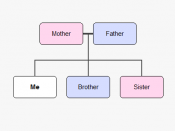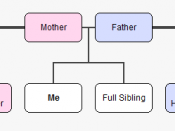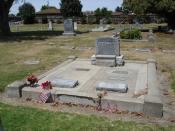A universal truth is an observation of human behavior over time the seems to remain constant despite place or circumstance. John Steinbeck uses a variety of universal truths to show how some people can either take advantage of their lives and be happy with what they have accomplished in their short blissfull period or mortality, and how others fail to exploit the full potential towards happiness that they themselves dont feel deserveing of. Our Town analyzes many universal truths about the morality of ordinary people as they pass through the normal stages of family life, love and marrige, and even the harsh tragedy of death.
In the first act, a young Emily Webb asks her mother if she is a pretty girl. This shows how children can be insecure in the developmental stage of life. She needs to be reassured that her peers will accept her, and she thinks that appearences are the way people judge her.
Also, George Gibbs and his sister Rebecca get into an argument like all siblings do from time to time. This showed that sibling rivalries are just a part of nature that can only be changed by time. As the siblings mature they tend to form a new relationship of mutual respect for one another that will carry them through the rest of their lives. Also in this act, George fails to do his assigned chores for which his allowance is given. Instead his mother does it for him assuming if he ever does the chores it will take far longer then neccesary. Anyone that has ever had any experience with childhood knows that kids are constantly ducking out of work to go and spend time with their friends.
A few years beyond the childrens maturation stage in this play, George and Emily decide that their friendship is more then just that. They discover they are in love even though in a way they knew it all the time. This shows a person that love is often not planned and it just happens often spontaneously without a couple actually realizing what is happening to them. Love like George and Emily's in this play is somewhat immature, because the two young lovers have hardley lived and still depend on their parents for most everything. It may seem to some that immature love has lessend to those who look at all the young teenagers who got married back generations ago, and to others it may seem that immature love has increased. People could argue that adolescents are just smarter about choices of relationships or just that society has changed the view of young lovers from a hundred years ago. Sometimes people just think they fall in love with someone because of the simple fact that they are afraid to be alone. They do not want to turn into an aging old person who has no stories about lost lovers. These people will get involved in a relationship and they will very possibly be unknowingly unhappy.
As people get into the later stages of life they can look back and say one of two things; "I sure am glad I lived my life the way I did. I don't regret a minute of it." and the others who would say, "I wish my life could have been different. If only I had done it right when I had the chance." Everybody knows they are going to die someday. It is the most fundemental of universal truths. However, a person may be much more accepting of there death if they can look back on their life and say that they don't regret anything. Emily never has the chance to ask herself that question becuase she is taken from life early while giving birth to her second child. She did not live a full life, but the part she lived was a pleasent one. Simon Stimson, on the other hand, had lived a very traumatic life. For a time he felt his only escape was to not remember the time he spent and turned to alcohol to fix his problems. Later in life when he asked himslef the question of his mortality he couldn't take the answer that was inevitably true. Simon Stimson found a new escape from life. That escape was death. When Emily died she had trouble accepting that she shouldn't go back to all the good times she had. She assumed seeing all of her friends and family would make her happy, but when she went back she saw how much she missed being with them. This finally showed her the truth about life. She understood what being mortal was all about. Ironically it took her death to show her the true joy in life.
In the end it seems that perhaps death isn't a harsh tragedy, but that death is the true blissfull ending. The sooner people realize that life is only what you make of it, the sooner those people can be trully happy, and the less Simon Stimsons we have in this world to bring us down and make us pity our fellow man, the better people can feel about themselves. The universal truths in Our Town showed the progression of life and the happiness of love, all coming to an abrupt end and yet an unexpected beginning.





